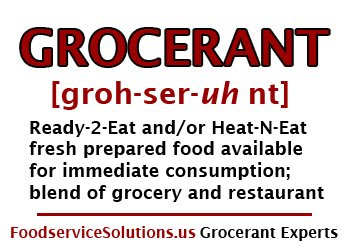That’s right
consumers want it both ways. Regular
readers of this blog know that Steven Johnson, the Grocerant
Guru® at Tacoma, WA based Foodservice
Solutions®
has documented the battle between the desire to eat out and the
need to eat in without cooking for over 6 years.
Grocerant niche
Ready-2-Eat and Heat-N-Eat fresh prepared food is a tool that helps time
starved consumers garner dinner for the family that is fresh, fast, and
fun
according to Johnson. While we have documented the progress of the rise of the
grocerant niche here from our own research. We have found some new research
that digs deeper, while edifying our results it also pointed out some new
insight we think are valuable.
The insights
were part of an Oracle Food and Beverage survey. The surveyed polled more than
5,700 global consumers across 11 geographies, including 512 in the Unites
States. Let’s take a look at what they found:
“This new survey shows that “Americans love new
tech-driven options for ordering and retrieving food, but the flipside is that
it is making them more impatient. Of those surveyed, 64% don’t want to wait
more than five minutes to order at the counter or drive-thru window, while 71%
of in-house diners were upset if they had to wait more than 10 minutes. More than half (55%) said they were fed up after five minutes of
waiting for food in a drive-thru, and 54% were annoyed waiting more than 10
minutes for food while dining at a restaurant.
“Online and mobile ordering was a lifeline to
restaurants shut-down in the pandemic and continues to provide steady revenue,”
said Simon de Montfort Walker, senior vice president and general manager
at Oracle Food and Beverage. “As already short-staffed restaurants reopen,
they are grappling with how to manage both in-person diners and deliveries,
while meeting growing expectations on speed and service. Technology that helps
kitchens manage and time orders from multiple channels will be key to keeping
pace and ensuring diners stay happy and loyal.”
Fast is not fast enough
The survey found that consumers have a short
window before they get exacerbated with the time it takes to get their order:
·
More than half (54%) of in-house diners don’t
like to wait more than 10 minutes to be served and 76% are impatient after 15
minutes
·
For those ordering at the counter, 45% said
they get annoyed if they must wait more than five minutes and 76% didn’t want
to wait more than 10 minutes to be served
·
At the drive-thru, nearly 1 in 5 consumers
(19%) don’t want to wait more than two minutes to get their food, while more
than half (55%) said they were fed up after five minutes of waiting
Kicking orders to the
curb
Curbside pick-up (or Click-and-collect) continues to be a
popular option that both determines where people chose to eat and their loyalty
towards a brand:
·
58% love this method and or are more apt to choose
establishments offering it
·
43% say it makes them more loyal to the eatery
·
54% say they would spend more because of this service
option, with that number jumping to 80% for Millennials
Personalized communications
aren’t creepy, they’re expected
The survey found that consumers have grown to
appreciate, and even expect, proactive recommendations their favorite
restaurants, but want to control access to their own data:
·
55% love the idea of receiving notifications about
personalized offers from restaurants based on their current location
·
45% want to be prompted with personalized order
suggestions based on their purchase history
·
46% would love to manage their dietary preferences with
their favorite establishments
·
56% would love visibility and control over who has access
to the personal data they share with restaurants and delivery drivers
Sustainability and healthy options rising in importance
In addition to offering click and collect, and
personalizing offers based on data, consumers are increasingly influenced by a
brand’s sustainability, environmental and corporate governance (ESG)
initiatives, and healthy meal options:
·
61% of Millennials rate efforts to lower food
waste (such as donations to food banks) as vital and influential to who they
spend money with
·
45% rate clear labelling about source of food
and ingredients as vital, with a slightly higher percentage of men versus women
(48% and 42%, respectively)
·
58% of consumers rate healthy options on menu
as important, with families rating this the highest at 74%, followed by
Millennials at 71%
Ordering preference is
situational
While mobile ordering continues to gain steam,
in certain settings, consumers still prefer human interactions:
·
65% prefer to order directly from a server when dining
in, while 18% would like to order from their mobile device
·
When ordering take out, 33% would like to order directly
from the restaurant on their mobile device, 18% from a third-party like
UberEats from their mobile device, and 25% directly from a server
·
38% prefer to order directly from a server when ordering
drive-thru, 38% prefer to order from their mobile device
·
52% of Millennials prefer to order from a server
in-person, but that number drops sharply to drive-thru’s, with only 17% wanting
to deal with a staff member and just 11% when ordering take-out
Payment options expanding
While cash is still high on consumers
preferred ways to pay (47%), restaurants are increasingly adapting to new forms
of payments to meet changing expectations:
·
60% of consumers like to pay with a credit
card
·
25% prefer to utilize contactless payment
methods such as Apple or Google Pay
·
7% are embracing alternative payments such as
cryptocurrency
Invite Foodservice
Solutions® to complete a Grocerant ScoreCard, or for product positioning or
placement assistance, or call our Grocerant Guru®. Since 1991 Foodservice
Solutions® of Tacoma, WA has been the global leader in the
Grocerant niche. Contact: Steve@FoodserviceSolutions.us or 253-759-7869






No comments:
Post a Comment